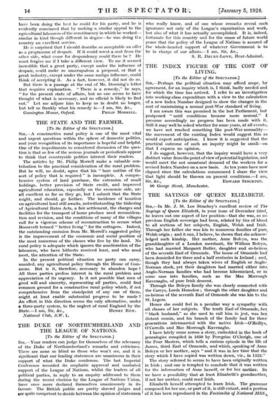THE REJECTED AGRICULTURAL SUBSIDIES. in the Editor of the SPECTATOR.]
Sra,—Your correspondent, Mr. W. F. Downing, tells us that during the recent election he was speaking and working in
an agricultural constituency, which he helped to wrest from the Liberals, and that in the accomplishment of this feat he found the proposed subsidy of fourteen millions a year to the agricultural interest very useful. It was, so he says, a " wry acceptable offer." I can only say I am sorry to hear
it. That he should have succeeded in wresting such a seat from one party to another is indeed a small matter, for what is one amongst so many? Least of all should I regret it if.
the Member who was dispossessed happened to be a Liberal of the " National " variety. But let us consider, in the cool light of the morning that follows a debauch, the sort of means by which this wresting appears to have been done. Suppose that Mr., W. F. Downing had been speaking and
working in the agricultusal constituency in which I live, and suppose that with all the ardour of a good Conservative and all the persuasive power of an author he had come to me one day during the election and addressed me in this sort of way Yon belong, I know, to that small and old-fashioned sect who call themselves Liberals, the Wee Frees as they are sometimes nick-named. You have interesting but may I say rather obsolete notions about individual liberty. You adhere to what you must forgive me for calling the curious shibboleth of Free Trade. But have you considered the effect of the offer which my_party, under its great new leader, Mr. Baldwin, is now able to make to you ? There are, as I know, upon your farm some 200 acres of arable land, andI believe I sin right in saying that you already pay to the able-bodied men whom you employ a wage of not Iess than 30s. a week. If, therefore, you will be so good as to buy from Inc this little piece of blue ribbon—you will understand that I cannot give it you, for that would be bribery—and come out with me as an up-to-date Tariff Reformer to speak and work for the Conserva- tive candidate, you will be doing what you can to secure for your- self at the expense of the general taxpayer an addition of about 2200 a year to your income. Surely that is an acceptable offer 1 "
To an appeal of that kind I know not what answer I should have made. I trust it would have been something in the nature of " Get thee behind me, Mr. Downing," though expressed, of course, in more modern and polite language. But the question of the answer is immaterial. The point to be observed is that in making such an appeal he would have been doing nothing at all contrary to the rules of election- eering as the game is now played. On the contrary, he would have been doing the best he could for his party, and he is evidently convinced that by making a similar appeal to the agricultural labourers of the constituency in which he worked— similar in kind though different in degree—he was doing tLe country an excellent service.
He is surprised that I should describe so acceptable an offer as a programme of despair. If it could wrest a seat from the other side, what cause for despondency could there be ? He must forgive me if I take a different view. To me it seemed incredible that a great party, except under the influence of despair, could make so unscrupulous a proposal, or that a great industry, except under the same malign influence, could think of accepting it. As a fact, however, it did not do so.
But there is a passage at the end of Mr. Downing's letter that requires explanation. " There is a remedy," he says, " for the present state of affairs, but no one seems to have thought of what is necessary, and no official is likely to find out." Let me adjure him to keep us in doubt no longer, but tell us frankly what his remedy is.—I am, Sir, &c.,















































 Previous page
Previous page